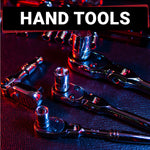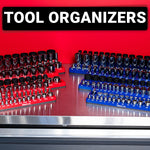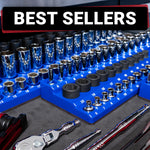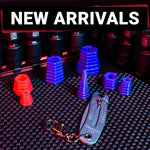At Olsa Tools, we pride ourselves on making professional-grade products that use the best materials and workmanship in the manufacturing process. There are various metals that we use in manufacturing our entire line of products, most commonly Chromium Vanadium, Chromium Molybdenum, and SVCM steel. In this blog, we are going to explain the properties of each material and why use them in our tools.
Chromium-Vanadium
What does Cr-V mean on tools? Also referred to as chrome-vanadium or Cr-V steel, this type of steel is ideal for many hand tools because of its strength and durability. Cr-V isn’t just one type of steel, but refers to a range of carbon steel alloys that contain various amounts of carbon, chromium, and vanadium (as well as traces of several other metals) to give the steel certain properties.
Carbon steels are designated with a 4-digit code: the first digit identifies the major unique element of the alloy, the second digit indicates the percentage of the major element, and the last two digits indicate how much carbon is present. For example, our Slim Profile Wrenches are made with 6140 steel. The 6 classifies it as a chromium-vanadium steel, the 1 indicates that the alloy contains approximately 1% chromium, and the 40 indicates 0.40% carbon content by weight (±0.05%). We commonly use 6140 and 6150 steel in our hand tools as they are well-suited for high-torque applications.
In addition to the alloying elements, the heat treating process is also an extremely important aspect to ensure performance of the tool. After the initial shape is forged, parts go through a sequence of heating and cooling stages to tweak the properties of the metal to get that perfect balance of hardness for longevity, without being too brittle.
Though Cr-V steel benefits from some level of corrosion resistance due to the chromium content, it can still rust which is why all of our Cr-V tools are finished with a chrome plating and polished to perfection, keeping your tools looking pristine for years to come.
Chromium-Molybdenum
Also referred to as chrome-molybdenum, chrome-moly, chromoly, or Cr-Mo, these 4100-grade steels have different properties compared to Cr-V which make them better suited for certain types of tools.
Though the heat treating process helps reduce the brittleness of our chrome vanadium tools, they are still too brittle to be used safely with impact wrenches. An impact gun exerts very intense forces in short bursts that can shatter Cr-V tools, both damaging the tool and potentially causing injury. That’s where Cr-Mo comes in: chromium-molybdenum can handle extremely high torque when properly heat treated and the resulting material is softer and is more likely to bend and deform rather than shatter under a sudden impact. For this reason, all of our impact sockets are made from Cr-Mo, in addition to some other products such as our 3pc Pliers Set.
If Cr-Mo is less brittle, why not use it for all tools? There are a few drawbacks to Cr-Mo which make it less ideal in some circumstances. Firstly, the fact that it is more malleable means that it can deform over time with heavy usage. Secondly, when it comes to impact sockets, the walls of the sockets are thicker to maintain strength; consequently, the sockets may not be able to fit into tight spaces as well as thinner-walled Cr-V sockets. Lastly, Cr-Mo will eventually show signs of rust and corrosion over time, especially in more humid environments. Though some surface rust usually won’t affect the usability of a tool, it does mean that these tools will show their age more than a shiny, chrome-plated Cr-V tool.
SVCM
SVCM steel is a kind of shock-resistant steel that is used in special cases. Superior toughness, durability, and torsional strength makes SVCM steel an ideal material for screwdriver shafts. You’ll find SVCM steel in our Torx Screwdriver Set and you will also find it in our striking impact pry bar set which is designed to handle extreme prying forces as well as sharp blows exerted by a hammer.
Olsa Tools carefully selects the right materials for each tool so we can confidently stand behind our limited lifetime warranty. We try to include as many details as possible on our product pages to help you with your purchase decision, but if you are ever looking for more information on a product, or would like some advice on which product would work best for your particular application, feel free to contact us and we’ll be happy to help! All of our tools are professionally-tested by Mechanics near our headquarters in Nisku, Alberta (The oil capital of Alberta). If you are interested in seeing how some of our wrenches are manufactured watch this video on how our wrenches are made.














